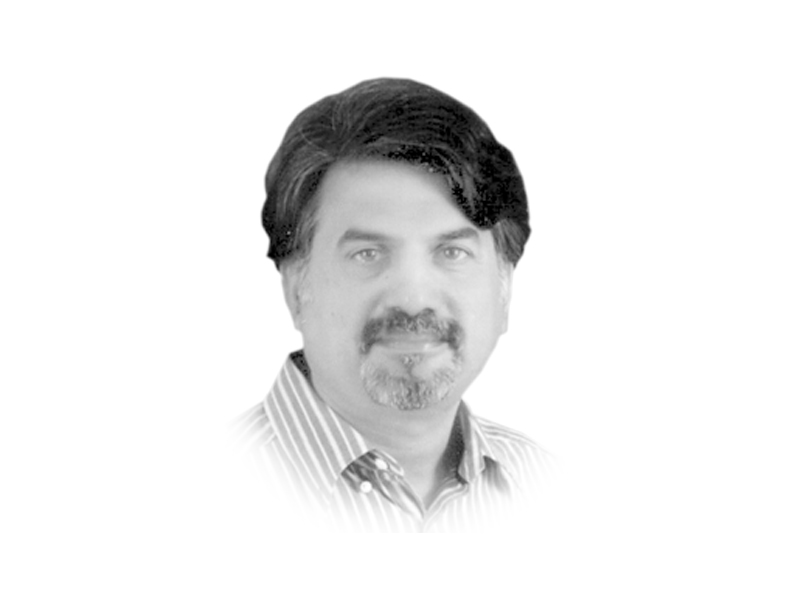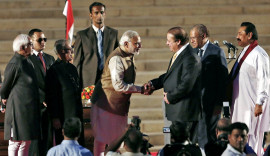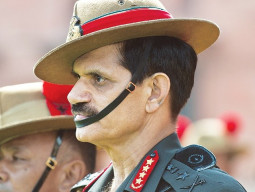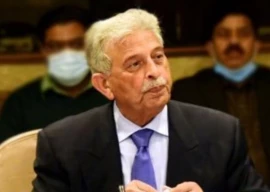

The tell-tale signs inform us that General (retd) VK Singh’s younger daughter was married to Southern Army Commander Lt General Ashok Singh’s son, Dr Anirudh. General (retd) VK Singh created a controversy by attempting to prolong his stay in the Indian military chief’s office, claiming his date of birth to be May 10, 1951 instead of May 10, 1950. Had the Indian government accepted his request of 10 months’ service extension, his eventual successor and the next senior officer in line to become the Indian army chief would have been his daughter’s father-in-law.
Despite the controversies surrounding General (retd) VK Singh’s last days in office, the former Indian army chief-turned-politician has created history by winning the Ghaziabad seat in the Indian general elections by a margin of more than 567,000 votes. He defeated actor-turned-politician Raj Babbar and journalist-turned-politician Shazia Ilmi, who were contesting against him and who embarrassingly lost their security deposits. General (retd) VK Singh’s victory is the second-highest victory margin in the country after Narendra Modi’s margin in Vadodra. Could a military general, who was found trying to negatively influence the promotion of a fellow military officer, be sent to the Indian parliament through such a resounding victory and get public acclaim for his services to the Indian state? The bottom line is that Prime Minister Modi, today, is a popular politician and a former Indian military chief, who does not approve of the appointment of the current Indian military chief, and the BJP government itself is pretty furious with the Congress for having made the appointment a few days before the end of its tenure. Who, then, is General Dalbir Singh Suhag?
After Sam Hormusji Framji Jamshedji Manekshaw (the only Indian soldier to be promoted to the field marshal rank), General Dalbir is the second Gurkha soldier to take over the reins of Indian military command. About Gurkhas, Field Marshal Manekshaw famously remarked, “If a man says he is not afraid of dying, he is either lying or he is a Gurkha.” Like the American General Stanley McChrystal, the current Indian army chief is also a fitness fanatic and reportedly runs 10km every day. Like the former Pakistani military chief, General (retd) Ashfaq Parvez Kayani, he is also from a humble background. His father, Ramohal Singh Suhag, was a subedar in the Indian Army and his previous two generations have also served in junior ranks in the army.
When on his first day in office, the new Indian army chief warned Pakistan on the alleged repetition of beheading-like incidents of Indian soldiers, one could not miss the ‘Gurkha tone’ in the language he spoke. The “more than adequate, intense and immediate” future response that the general spoke of reminded me of General Manekshaw and his cavalier military speeches.
Being a student of civil-military relations, I fail to understand why the largest democracy in the world fails to rein in its military commander from making policy statements. Unlike in Pakistan, in India, the responsibility of national defence rests with the cabinet (politicians). The defence policy is further discharged through the ministry of defence. The strategy of “immediate and intense military response” becomes ‘non-serious military jargon’ when coming from a military leader speaking on his first day in office. Coming from the person occupying the pinnacle of the Indian political pyramid, such a statement would have made an altogether different meaning.
Felicitations, in any case, to the Gurkha soldier for becoming the Indian army chief. I hope he respects his Indian political masters as much as we want our military commanders here to respect ours. I understand the huge gulf that separates the Pakistani political environment from the Indian one, but having followed the only other Indian Gurkha military chief, I hope he doesn’t hold the same opinion about Indian politicians. Field Marshal Manekshaw’s notion about his political masters four decades earlier was simple. He said, “I wonder whether those of our political masters who have been put in charge of the defence of the country can distinguish a mortar from a motor; a gun from a howitzer; a guerrilla from a gorilla; although a great many resemble the latter.”
In Pakistan here, we need to keep our fingers crossed. We have a democratic government that is under intense political pressure and faces an existential challenge from an uncompromising and a street-demonstrating opposition. Our army is fighting against terrorists on our western front. It has also been called upon to aid civil power in the capital and may soon find itself doing the same in other major cities. If the politicians fail, the only force that moves to fill in the vacuum is the armed forces.
The last thing Pakistanis want is a tough-talking Indian military chief dishing out ‘military threats’ on his first day in office. I hope political masters remain in charge of Pakistan, and also, the politicians in India, who remain in charge of preventing a military chief from implementing a ‘military extravaganza’ that may result in adverse military and political consequences in the region.
Published in The Express Tribune, August 19th, 2014.
Like Opinion & Editorial on Facebook, follow @ETOpEd on Twitter to receive all updates on all our daily pieces.
COMMENTS (63)
Comments are moderated and generally will be posted if they are on-topic and not abusive.
For more information, please see our Comments FAQ






























1714024018-0/ModiLara-(1)1714024018-0-270x192.webp)









I love it when Indian trolls get worked up and refuse to accept blatant truth.
@observer: " There is one thing I also fail to understand- Who has admitted you to a PhD Programme?" +++++++++++++++++++++++++++++++++++++++++ Wah Wah u made my morning.
Mr. Eshan, you really will be sorry that you wrote an incomplete and inaccurate article. Suggest do more research before publishing such articles, unless you intended to create controversy. This PhD education may not be enough.
"Felicitations, in any case, to the Gurkha soldier for becoming the Indian army chief. I hope he respects his Indian political masters as much as we want our military commanders here to respect ours."
This is of course coming from a Pakistani journalist whose impeccable credntials we should laud and listen with much esteem. He sees how this subservient Ghurkha is merely a mercenary and not a true Indian, how could he be? He has masters as most Ghurkhas do, no? This is coming from a man who reports on a country that harbors terrorists and is a state sponsor of terror. Clearly this journalist is a man of penetrating insight who sees through the fluff and lies of the Indian state. Pakistan is a model of democracy and transparency and will no doubt bring the light of Islam on the deluded Indians. That was the dream from the very start, no? Allah has a special plan for Pakistan.
Being a student of civil-military relations, I fail to understand why the largest democracy in the world fails to rein in its military commander from making policy statements.
Sir Ji,
There is much else that you fail to 'Understand'.
A. Sam Manekshaw is NOT the only Field Marshal.
B. Sam Bahadur was a Parsi and not a Gurkha.
C. Gen Suhag is not a Gurkha either.
D. Indian Army has never ever staged a coup.
E. The decision to march to Lahore and to aid Bangladesh were decisions of the Civilians.
AND,
There is one thing I also fail to understand- Who has admitted you to a PhD Programme?
Few corrections to the article.
1) As per latest Indian Army circular of 21 July 2014, Rank never retires, soldier does. Therefore the correct designation is Gen V.K. Singh (Retd.) and not Gen (Retd.) V.K. Singh.
2) Gen. Dalbir Singh Suhag belongs to the Gorkha Regiment (commissioned into it) and therefore is the second soldier from the Gorkha Regiment to become the Chief of Indian Army after Field Marshal SHFJ Manekshaw. The author may have tried to convey the same message but probably gave the impression that Gen D.S. Suhag is a Gorkha.
3) And, finally the comment that Field Marshal SHFJ Manekshaw is "the only Indian soldier to be promoted to the field marshal rank" is incorrect as the Indian Army also had another Field Marshal in Field Marshal K.M. Cariappa. This is in addition to Marshal of the Indian Air Force Arjan Singh.
Dipak@Rangoonwala: You need to go back to Rangoon. They will take care of you real good, you will never forget.
Pakistan's main problem is too much obsession with military , Generals , Military hardware and above all destruction centric mentality . We never read in the news paper about , new inventions , new discovery , new research and above all evolution of humans . Generals come and go because they are Govt servant not the Govt and so why over emphasis on them ? It is the govt who make difference in the life of masses so keep an eye on this and not on generals who always demands more than the income of the state for the defense of the state and this story is going on in every country on the planet . Have you heard that any General in the world has told the Govt to cut defense expenditure ?
@Rangoonwala: You are whining about Indians leaving nasty comments here. I thought you were "Going in a tizzy" :-)
@Dr Sameena Hussain: Thank you for the information about the practices followed in army around the world. At least I was not aware of this practice till I read your comment.
@Jawaid: Yeah, as they say... In the army, out of 10, 9 are fools...
@Dr Sameena Hussain: @Stuka: Sorry, your explanation does not fly. Why? He refers to Indian masters. He thus clearly believes that both these are of Gorkha ethnicity. Certainly the quotation by Gen. Sam Maneckshaw refers o Gorkha ethnicity and not the regiment, so it would not have been relevant o include if the discussion related to the regiment.
@Rangoonwala: Very true. Unfortunately such is the subordination of the generals to the civilian leadership out here. In you country its very different. There the generals themselves decide how much they should get and when. And the civvies dare not question the one liner defence budget that they are presented with and supposed to rubber stamp.. Right?
@Dr Sameena Hussain:
Good explanation. Author comes from military background and assumed that every one understands military terminology. He should have explained or clarified that.
Indian army reports to Civilian Govt and doesn't control Foreign Policy - pretty much says it all.
How can ET publish such rubbish? Gen Dalbir is a Jat from Haryana and not a Gorkha. Yes, he is from Gorkha Regiment, but that does not mean he is Gorkha by race. Also India has had 2 field marshals : Gen Cariappa was the first officer to hold the rank of field marshal, Gen Manekshaw was the second. @D V Joshi: No I dont think the author means 'culture of the regiment' since he mentions about 'taking orders from his INDIAN masters'
the day Indian army talks big, that would be his last day. He will be kicked out of his chair by no one else than the civilian who will always over rule him.
@Kufristani and others You all are missing the point. The Indian COAS may not be 'Gurkha', he doesn't have to be. In army/military lingo, you don't have to be an ethnic Gorkha or Gurkha to be called a 'Gorkha' Officer in the Army as your regiment comes first in terms of your identity and NOT your ethnicity. There are Gorkha regiments in the British Army and the officers commanding are usually British but still addressed as 'Gorkha' officers. Simillarly in pakistan, a Baloch regiment could be commanded by a Punjabi officer however not sure whether they would like to be addressed as Baloch officer. Many thanks
"I hope he respects his Indian political masters as much as we want our military commanders here to respect ours" As if pakistani politicians always had control over the army.And respected Army Chief is from HARYANA . Why paki's dont do enough research before writing articles on INDIA another such fellow is JAVED NAQVI
The author has made a mountain of a mole hill. The fact of the matter is that Pakistan is indulging in unprovoked firing on 20 BSF posts which was started when Modi visited Kargil on Aug 12 which is still continuing. It is no coincidence that Pak military start something on LoC just before talks between two countries are scheduled to be held which incidentally were to take place on Aug 25. Since India did not cancel talks on this issue, another provocation of holding meeting with APHC leaders was orchestrated which led to cancellation of talks. No meaningful talks can take place as long as the military dictates the foreign policy in Pakistan to continue its dominance.
@Sher Singh Gill: Reading this paper is like sitting in India, perusing a local rag. All 1.8 billion trolls are on this website. Taking turns, leaving nasty comments.
To all Indian civilians, the author is not claiming that Gen Suhah is a Gurkha by ethnicity. His reference is to regimental affiliation. My uncle, a Punjabi, was commissioned in a Gurkha regiment and retired as a LT Gen - he refers to himself as a Gurkha because that is his regimental identity.
@gv: What else would you expect of a Colonel. Sad to know ET's publication standard has stooped so low. Only 2 days ago I saw a pathetic article written by Ziaul's spawn, and now this...
this is not for the first time i see a Pakistani Army man showing his concern for democracy in India.Irony thou name is Pakistan.
"I hope political masters remain in charge of Pakistan, and also, the politicians in India, who remain in charge of preventing a military chief from implementing a ‘military extravaganza’ that may result in adverse military and political consequences in the region." The writer has made a mountain out of a mole hill. While the civilian govt in Pakistan has never been in control of its military during its entire existence as a nation for more than 67 years, which is the core of the problem in its foreign policy, there has never been, is and will be a situation where the Indian military decides India's foreign policy. A public statement by a military chief in India does not warrant such a harangue by the writer.
@Rangoonwala:
There is no point in arguing with u as they say never argue with a fool as a fool is master of his foolishness
@Rangoonwala: "With your convoluted long winded sanctimonious diatribe...".
convoluted-long-winded-sanctimonious diatribe. That's what's stylistically called an adjective pile-up. Talk about pot calling the kettle black.
hehehehe PhD from ? Islamabad University ???
Someone brought up the matter of the Queen of England and Gorkhas (the correct spelling from the eponymous district in Nepal they come from), so I wanted to elaborate on that.
Initially during independence, the British so wanted the Gorkhas that they decided to split the existing 20 battalions all headed by Indian officers 12-8 between India and Britain. However most of the Gorkhas opted instead for India.
The number of Gorkhas in the British Army has dwindled whereas the Indian Army now has 46 battalions with 40,000+ Gorkhas.
@Rangoonwala:
Does this quote ring a bell in your head?:
*Today we are the poorest, the most illiterate, the most backward, the most unhealthy, the most un-enlightened, the most deprived, and the weakest of all the human race *
Let me give you a clue who said it. It was no other than ex President Musharraf. I recommend you go to a proper school and learn some basic things such as respect and courtesy. No point in being brainwashed at a madrassa.
@Rangoonwala: and you lost all 4 wars against India, along with losing Democracy from day 1.
General Suhag did not make any policy statement about the country. He did answer a pointed question related to army's policy vis-a-vis ceasefire violations at LOC and beheading of Indian soldier. What is strange about this? He is not a hawaldar after all - he is the COAS.
For someone working on his Ph.D. Your fact checking skills are really poor. Others have pointed out, so I will not repeat?
Finally on a day that your army has scuttled peace talks with India, you are a fine one to comment aout the professionalism of the Indian army and reporting to civilian masters. Indians do not distribute sweets when an elected government is dismissed, they fight any attack on democracy tooth and nail as history shows when Mrs. Gandhi implemented emergency. So worry about the oing ons in your own country. We will take care of our own.
He was the commander of Gurkha Regiment,like Manekshaw ,so the author is saying he is a Gurkha. He is talking about culture of that regiment !
with great respect to you mr ehsaan,its worth noting that Gen.suhaag reffering not a policy by political masters of india.its action part of military thinking of indian army which has nothing to do with politicians.its still under domain of soldier of both side army i belive..Further india refuses to be on receiving side of blow which your army always expected from indian army responce of past.your nuclear blackmail is not going to work under hardliner Mr modi who was groom by RSS a fundamentalist organisation.i hope pakistan should start thinking that kashmir word is a poison and slowly it will speed up demise of leftover pakistan whatever situation it is facing.
@nrmr44: You lost the collective readerships at Parliament. With your convoluted long winded sanctimonious diatribe. Keep it short and simple. And check your spellings.
[Moderator replying to confused troll from India. Birth right of every commenter.]
"Being a student of civil-military relations, I fail to understand why the largest democracy in the world fails to rein in its military commander from making policy statements."
As many have pointed out Suhag isn't even a Gurkha. So much for your understanding of the civil-military relations. India isn't Pakistan and Indian Army is not even remotely similar to the Pakistani Army. The sad truth is that the incredulous politicians of the "largest democracy in the world" have not just reined in the Indian Army, they have systematically constricted it with delayed procurements and by allowing incompetent bureaucrats to boss over military generals. Moreover, for all the conflicts that have taken place between India and Pakistan, haven't your army's antics been responsible?
You rein in your army, ours is disciplined to take care of itself.
very poor fact checking in this article
@Rangoonwala: You're welcome! Little things amuse little minds! As for the wrtiter, if he is serious about his PhD he will have to go beyond Army-Govt in India, and also study Parliament, Judiciary, President's office, and various autonomous Constitutionally-appointed institutions which together make India stable. He will also have to study the common people of India, who are not passive standers-by, as they are in Pakistan. The trouble with being a researcher in Pakistan is that you don't get to see or experience at first hand all the variables that make a modern nation-state. Walking backwards into the future, with sight fixed devotedly on medieval systems, modern scholarship is not something to be found on a road that started in a Madrasa. Good luck, anyway!
This guy doesn't have his facts right. Besides, it is ironic when an a retired Lt. Col. of the Pakistan Army talks about civilian control of the armed forces in India.
@Rangoonwala: We don't consider ourselves Hindus, but Indians. Our nation is much higher than our identity as a religion. Pak would not understand that since their identity is religion, nation comes in the end.
My goodness! I can't believe there are such significant factual errors in this piece. A quick Wikipedia/Google search confirms what some of the comments mention - Field Marshal Maneckshaw was a Parsi, not a Gorkha. He was not the only Indian soldier ever to be Field Marshal; so was Field Marshal Cariappa. And Gen. Suhag is a Jat not a Gorkha. Please fact-check your articles before sending them off to print; such errors affect your credibility.
There are few points author got completely wrong. 1. Gen Kariappa was also promoted to rank of field marshall. Gen Sam Manekshaw is not the only one. 2. Gen. Sam Manekshaw is not a gurkha, he is a parsi from Bombay. 3. Gen. Suhag is not a Gorkha as well. 4. Please do not post tell-a-tale regarding the "father-in-law as next general", you should quote accurate sources for your claims. 5. Even though any army general tries to take over the nation, the soft power in India is strong enough to create substantiale pressure on the army to back off.
@PrasadDeccani: @someone: Love it when Hindu trolls get all worked up. Going in a tizzy. Love doing that to them.
[Moderator responding to Hindustani trolls. Due diligent right]
There was another great soldier who was promoted after retirement to the rank of Field Marshall in the Indian Army. Field Marshall K M Cariappa. He was the First Indian Commander In Chief of the Indian Army as well. Guess you need to brush up on your PhD research skills.
I have noticed this several times. The op-eds of ET are sub-par. Usually rhetoric is passed on as editorial.
Grammar is rarely checked.
This article has many factual errors and is a disgrace.
One such error is: "the only Indian soldier to be promoted to the field marshal rank"
This is not true. General Cariappa was also a field marshal.
There are many factual errors in this. People like this should quit journalism and start writing unbelievable tales like Slumdog Millionaire.
I have read better articles from the author. Reading this one seemed like he was stretching to fit in the Indian change of command. Very uninteresting narrative with no seemingly relevant purpose.
ET, how come you are so scared of your establishment???? Mere a simple critical mention of your army make you tremble I suppose and makes you not to publish the comments.
@Rangoonwala: One such Havildar has caused breakup of Pakistan in 1971. This one may just end the story for good. Any way, Indians are more proud on their "Havildars" than Pakistanis on their "Tiger Niyazis".
@Rangoonwala: and your guys get decorated for losing wars !!!
10 km? What a wimp.
Gurkhas are Nepalese only. Suhag is no Gurkha. The Queen has only Gurkhas from Nepal as her guards. Suhag Man doing his song/dance routine to get paid. Or.... Hindustani Havildars,...to do their fierce dance. Or they don't get paid. [Sorry, generals..? not Havildars.]
Well done Gen Suhag. You are showing what the Indian military really is that is to protect our borders. Hats of to PM Narendra Modi for his blunt talk about Pak' s proxy use if terrorists. Now Pakistan needs to get used to a tough response unlike the puppet Manmohan Singh.
The base of the article that Dalbir Singh Suhag is a Gurkha is wrong , he is from Rajasthan and is a rajput. Like every person in Sikh regiment is not a Sikh similarly not every officer of Gurkha Regiment is a Gurkha.
Who the Indian army chief chooses to threaten is its & india's prerogative. Why should we care how fragile pakistan's democracy is? Having said that ur knowledge of the Indian army & of Sam manekshaw, who was the hero of 1971, is pleasantly surprising.
New Army Chief? Does not look like it. Same Sikh gentleman Maybe looking younger by 6 months.Sabre rattling to earn his keep. Trying to look fierce, throwing challenges, warnings? Oh please,... just mail them. You already have xeroxed copies from the previous chief,...?
I don't get it. Why does Pakistan intelligentsia wishes for Indian army to show all restraint while their own army keep working on their nefarious agenda and while their civilian government keep ignoring it? I mean come on. Instead of wishing something from Indian army, should not author and likes him try to put pressure against their own army to stop creating troubles between the two country? Or is every one scared after Hamid Mir's episode?
When there is political instability in our country , the adversaries will be fishing for trouble and weakness, Pakistani military has it's hands full by guarding the Eastern Front and eradicating the menace of terrorism and religious fanatics in FATA and that is why this General is talking tough but now even Modi is muddying the waters, they have already canceled the talks leading to normalize relations between the two countries. Nawaz Sharif has created this problem in the first place by his heavy handedness, his brother went on a murderous rampage in Lahore and he is still there, in a democratic government there should be no place for people like him and above all they are banking too much on Saudi and to some extent on US support. Both countries has been interfering in Pakistan's internal affairs for a long long time. US pushed for years to go into North Waziristan and NS obliged. By the way some Indian Generals may have contempt for policians by calling them gorillas, it seems to me that they are trying to emulate Pakistani Generals.
Some moths earlier this newspaper has an article on how Gen(retd) VK Singh will not let Gen Suhag become Chief Of Army Staff, It looks this newspaper is taking unusual interest in Indian Army.Gen Suhag was forced by News Paper correspondent to react in the way he spoke which looks jingoistic to Pakistan but Indians expect his army chief to retaliate any act of beheading its soldiers by enemy, so there is nothing to be so alarmed about it.
While the Pakistani army is the power center in Pakistan that controls defense and foreign policies ... allocates and sanctions its own budget ... is not accountable to or reports to anyone in Pakistan but itself ... this author expresses concern about the Indian army to remain under civilian control ... what kind of mischief is this ... ??
Gen. Suhag is a rustic fellow Jat from Haryana. He is an honest hard task master. Gen VK Singh was an embarrassment to Indian army with his foot always in mouth. Gen Suahg is going to be a great army chief. I don't think we will be hearing much from Gen Suhag. He is a simple humble guy. His parents still like typical rural farmers.
Very poorly researched article and also high on the author's imagination. While the sequence of events narrated are true and known to all - the author's fervent imagination then takes over. There is no conspiracy, Pakistani style. The Chiefs are appointed strictly by seniority.And this exactly what has happened every since. No surprises. The demand by Gen VK Singh to re-state his date of birth was rejected by the Courts after loking at all the evidence. Thats how Institutions work in a Democracy. The problem is dead and buried, except perhaps inthe authors mind, fed as it is by conspiracy theories in Pakistan and the shenanigans of it;s own Army. No One in India talks about it any more.
Gen Suhag is NOT a Gurkha. He is a Jat from Jajjar district Haryana!! Just serving in the Gurkha Regiments donot make a soldier Gurkha. There are thousands of Tamils, Rajputs, Jats, Panjabis, Malayalis serving valiantly in the Gurkha Regiment - but this donot make them Gurkhas. They serve mainly in the transferable Officer Cadre. However, the soldiers and ranks in these Regiments are predominantly Gurkha. Likewise, Field Marshal Manekshaw must be rolling in his grave - he is very well known and observing Parsee man of the Zoarastrian Faith - worshippers of Ahura Mazda. Gurkhas are Hindus really donot understand why the author has to drag him into this?
Don't know what is source of this author. Dalbir suhag is not a gurkha. He is a jat from state of haryana bordering punjab. Nearly all information is so fabricated. No wonder pakistanis are blatent liers
Gen Suhag is not Gurkha. He is from a Jat family in Haryana. He was commissioned to the 5 Gorkha Rifles, an infantry regiment of the Indian Army. You can try and spin as you much as you want but Indian Army is not Pakistan Army. Indian Army is under civilian command. There is no such thing as civilian command in Pakistan. Every one knows.